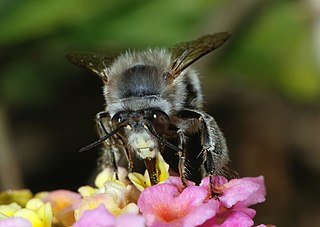
The bee genus Anthophora is one of the largest in the family Apidae, with over 450 species worldwide in 14 different subgenera. They are most abundant and diverse in the Holarctic and African biogeographic regions. All species are solitary, though many nest in large aggregations. Nearly all species make nests in the soil, either in banks or in flat ground; the larvae develop in cells with waterproof linings and do not spin cocoons. Males commonly have pale white or yellow facial markings, and/or peculiarly modified leg armature and hairs. Anthophora individuals can be distinguished from the very similar genus Amegilla by the possession of an arolium between the tarsal claws.
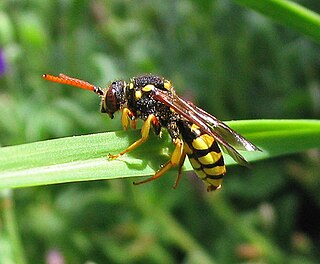
With over 850 species, the genus Nomada is one of the largest genera in the family Apidae, and the largest genus of cuckoo bees. Cuckoo bees are so named because they enter the nests of a host and lay eggs there, stealing resources that the host has already collected. The name "Nomada" is derived from the Greek word nomas, meaning "roaming" or "wandering."
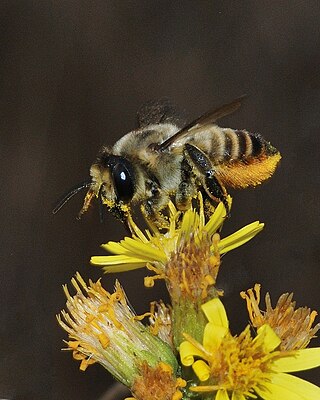
The genus Megachile is a cosmopolitan group of solitary bees, often called leafcutter bees or leafcutting bees; it also includes the called resin bees and mortar bees. While other genera within the family Megachilidae may chew leaves or petals into fragments to build their nests, certain species within Megachile neatly cut pieces of leaves or petals, hence their common name. This is one of the largest genera of bees, with more than 1500 species in over 50 subgenera. The alfalfa leafcutter bee is managed on a commercial scale for crop pollination, and has been introduced by humans to various regions around the world.

Osmia bicornis is a species of mason bee, and is known as the red mason bee due to its covering of dense gingery hair. It is a solitary bee that nests in holes or stems and is polylectic, meaning it forages pollen from various different flowering plants. These bees can be seen aggregating together and nests in preexisting hollows, choosing not to excavate their own. These bees are not aggressive; they will only sting if handled very roughly and are safe to be closely observed by children. Females only mate once, usually with closely related males. Further, females can determine the sex ratio of their offspring based on their body size, where larger females will invest more in diploid females eggs than small bees. These bees also have trichromatic colour vision and are important pollinators in agriculture.
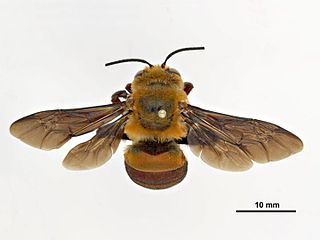
Amegilla dawsoni, sometimes called the Dawson's burrowing bee, is a species of bee that nests by the thousands in arid claypans in Western Australia. It is a long tongued bee, of the tribe Anthophorini and genus Amegilla, the second largest genus in Anthophorini.

The hairy-footed flower bee is a species of bee belonging to the family Apidae.

Lasioglossum zephyrus is a sweat bee of the family Halictidae, found in the U.S. and Canada. It appears in the literature primarily under the misspelling "zephyrum". It is considered a primitively eusocial bee, although it may be facultatively solitary. The species nests in burrows in the soil.

Anthophora ursina is a species of anthophorine bee in the family Apidae. It is found in North America.
Anthophora pacifica is a species of anthophorine bee in the family Apidae. It is found in North America.

Anthophora villosula, the Asian Shaggy Digger Bee, is a species of anthophorine bee in the family Apidae. It is presumably native to Asia but has been introduced in Maryland, where it has become established.
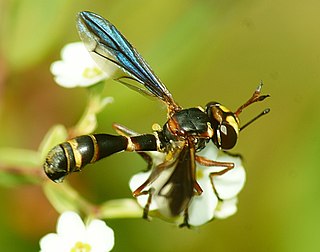
Physocephala marginata is a species of thick-headed fly in the family Conopidae. It is a parasite of Anthophora abrupta bees, although pupation occurs only after death of the host bee.
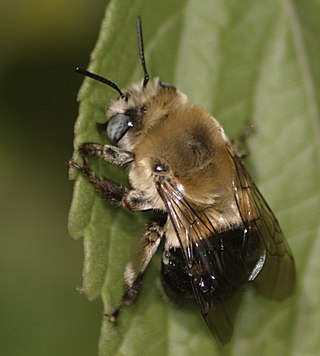
Anthophora montana is a species of anthophorine bee in the family Apidae. It is found in Central America and North America.

Anthophora californica is a species of anthophorine bee in the family Apidae. It is found in Central America and North America.
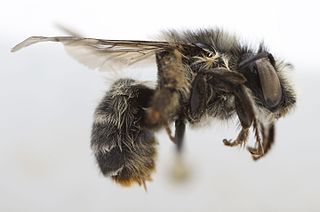
Anthophora terminalis is a species of anthophorine bee in the family Apidae. It is found in North America.
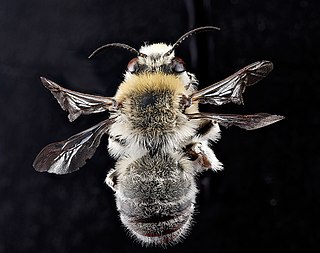
Anthophora occidentalis is a species of anthophorine bee in the family Apidae. It is found in North America.
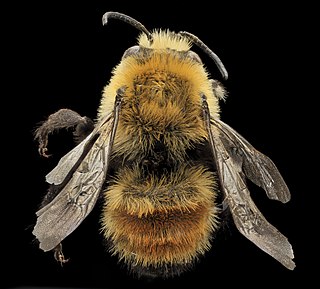
Anthophora bomboides is a species of anthophorine bee in the family Apidae. It is found in North America.
Anthophora centriformis is a species of anthophorine bee in the family Apidae. It is found in Central America and North America.
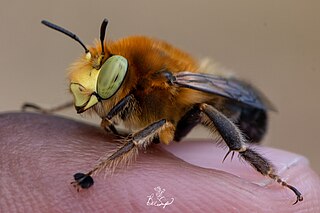
Anthophora crotchii is a species of anthophorine bee in the family Apidae named after George Robert Crotch. It is found in North America.
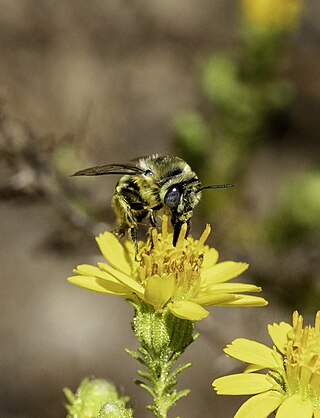
Anthophora urbana is a species of anthophorine bee in the family Apidae. It is found in Central America and North America.
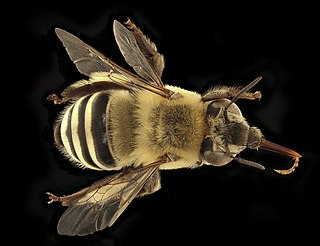
Anthophora walshii is a species of anthophorine bee in the family Apidae. It is found in North America.



















